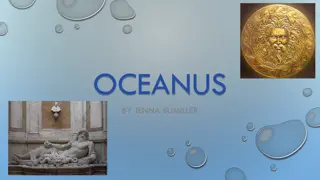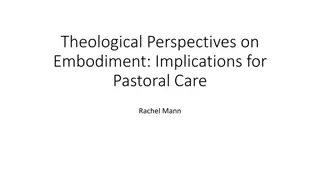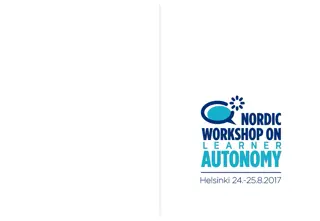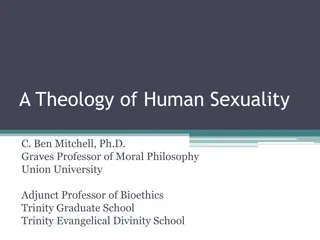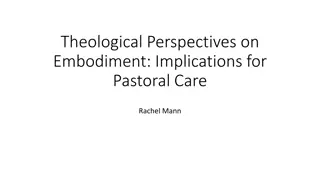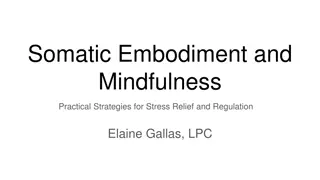Embodiment
In the debate on the joy of fish, Zhuangzi challenges perceptions of happiness, raising questions on understanding emotions in non-human beings. The concept of embodied cognition explores the intricate relationship between physical bodies and cognitive processes, adding depth to discussions on how we experience and interpret the world around us. This journey delves into the interplay of perception, memory, and social factors in shaping our understanding of intelligence and consciousness, highlighting the complexities of human existence. Discover the essence of cognition intertwined with corporeal embodiments, bridging the realms of thought and physicality.
Download Presentation

Please find below an Image/Link to download the presentation.
The content on the website is provided AS IS for your information and personal use only. It may not be sold, licensed, or shared on other websites without obtaining consent from the author.If you encounter any issues during the download, it is possible that the publisher has removed the file from their server.
You are allowed to download the files provided on this website for personal or commercial use, subject to the condition that they are used lawfully. All files are the property of their respective owners.
The content on the website is provided AS IS for your information and personal use only. It may not be sold, licensed, or shared on other websites without obtaining consent from the author.
E N D
Presentation Transcript
Embodiment CS786 February 15th2022
Recap: the mind constructs information Current neuroscience and AI fashions argue for the brain as a passive store of information The mind is not a passive receptacle It exists in a body with a long history and a complex present It constructs information based on being in the world (Heidegger)
The Debate on the Joy of Fish Zhuangzi and Huizi were enjoying themselves on the bridge over the Hao River. Zhuangzi said, "The minnows are darting about free and easy! This is how fish are happy. Huizi replied, "You are not a fish. How do you know that the fish are happy?" Zhuangzi said, "You are not I. How do you know that I do not know that the fish are happy? Huizi said, "I am not you, to be sure, so of course I don't know about you. But you obviously are not a fish; so the case is complete that you do not know that the fish are happy. Zhuangzi said, "Let's go back to the beginning of this. You said, How do you know that the fish are happy; but in asking me this, you already knew that I know it. I know it right here above the Hao." How do we know which dog is happy And which is sad?
Embodied cognition The claim that cognition is deeply dependent on the fact that we inhabit bodies of flesh and blood Always in tension with efforts to abstract human-like intelligence into machines Flavors of embodiment Perceptual Memory Social







